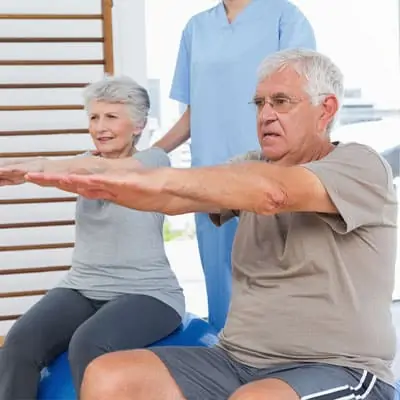By Gagan Toor PT, Cambridge Physiotherapy & Rehab Center, Cambridge, Ontario
Amyotrophic Lateral Sclerosis (ALS) is a progressive neurodegenerative condition that affects the nerve cells responsible for controlling voluntary muscle movement. Over time, these motor neurons weaken and die, leading to muscle wasting and loss of function. Among the many challenges faced by individuals living with ALS, one of the most concerning and impactful is difficulty with breathing.
At Cambridge Physiotherapy & Rehab Center, we often meet clients and families navigating the complexities of ALS. While the disease cannot yet be cured, physiotherapy plays a crucial role in managing symptoms, maintaining comfort, and preserving independence for as long as possible. One of the lesser-known but highly important benefits of physiotherapy is its impact on respiratory health — helping patients breathe better, longer, and more efficiently.
Understanding Breathing Challenges in ALS
As ALS progresses, it doesn’t just affect the arms, legs, or speech; it also weakens the muscles responsible for breathing — primarily the diaphragm and intercostal muscles between the ribs. These muscles are vital for drawing air into the lungs and exhaling effectively.
When these muscles lose strength:
- Breathing becomes more shallow and labored.
- The ability to cough and clear mucus diminishes, increasing the risk of chest infections.
- Fatigue and shortness of breath become more noticeable, even at rest or during sleep.
Without intervention, respiratory decline can severely affect quality of life and overall health. This is why early physiotherapy intervention is so critical — it gives individuals the best chance to preserve lung capacity and maintain independence for as long as possible.
How Physiotherapy Supports Breathing in ALS
Physiotherapy offers evidence-based strategies to manage and improve respiratory function. Our goal is not just to strengthen the body, but to empower patients and caregivers with tools that make day-to-day life more manageable.
Here’s how physiotherapy can make a difference:
1. Respiratory Muscle Training
Through gentle and structured breathing exercises, physiotherapists can help maintain or improve the strength and endurance of the diaphragm and other breathing muscles. These exercises may include:
- Inspiratory muscle training (IMT): Using a simple handheld device, patients practice breathing against mild resistance, gradually improving lung capacity.
- Breath control techniques: Teaching clients how to optimize their breathing pattern to reduce fatigue and maintain oxygen flow.
Even when full muscle strength cannot be recovered, maintaining partial activity can delay decline and help patients breathe more comfortably.
2. Airway Clearance Techniques
As coughing becomes weaker, secretions can build up in the lungs, leading to infections. Physiotherapists teach safe and effective airway clearance methods, including:
- Assisted coughing techniques
- Manual or mechanical cough assist devices
- Postural drainage positions to help mucus move out of the lungs
Regular airway clearance routines can significantly reduce the risk of pneumonia and hospitalization.
3. Positioning and Postural Support
Body posture has a major influence on breathing. As ALS progresses, muscle weakness or stiffness can lead to slumped or restricted positions that make breathing harder.
A physiotherapist can guide patients in:
- Optimal seating positions for easier chest expansion
- Bed positioning for better overnight breathing
- Use of supports and braces that reduce strain on the chest and shoulders
Good posture not only helps breathing but also prevents secondary complications such as pain and joint stiffness.
4. Energy Conservation and Activity Pacing
Breathing difficulties can make even small tasks exhausting. Physiotherapists teach energy conservation techniques — how to pace activities, plan rest breaks, and use mobility aids to preserve energy.
By managing fatigue and effort, patients can continue participating in meaningful activities for longer periods.
5. Education for Patients and Caregivers
Education is a cornerstone of physiotherapy in ALS care. Our team ensures that both patients and caregivers understand:
- How to monitor breathing changes
- When to seek medical attention
- How to safely perform home exercises and use respiratory aids
Empowering caregivers with knowledge helps reduce anxiety and ensures consistent support at home.
Why Starting Physiotherapy Early Matters
In ALS, timing is everything. Because the disease progresses gradually, early physiotherapy can make a substantial difference in maintaining function before weakness becomes advanced.
Here’s why early intervention matters:
- Prevention Over Reaction:
Starting physiotherapy early allows individuals to build a strong baseline. Muscles that are trained and mobilized early tend to maintain strength longer. - Learning Before It’s Needed:
It’s easier to learn breathing and positioning techniques while strength and mobility are still relatively good. Once breathing becomes more difficult, learning new skills can be tiring and stressful. - Preserving Independence:
Early physiotherapy focuses on empowering patients — giving them control over their health and helping them adapt gradually as changes occur. This independence contributes greatly to emotional well-being. - Delaying Respiratory Decline:
Studies show that consistent physiotherapy and respiratory training can slow down the decline of vital capacity in ALS, potentially extending quality of life.
The Collaborative Approach to ALS Care
At Cambridge Physiotherapy & Rehab Center, we believe in a multidisciplinary approach. Physiotherapists work closely with neurologists, respiratory therapists, occupational therapists, and speech-language pathologists to ensure comprehensive care.
For example:
- A respiratory therapist might help with ventilatory support or cough assist devices.
- An occupational therapist might recommend adaptive equipment for comfort and mobility.
- A speech-language pathologist can assist with swallowing and communication, both of which are linked to respiratory function.
Together, this team-based approach ensures that every aspect of a person’s health and comfort is supported.
Compassionate Support for Every Stage
ALS is a life-changing diagnosis, but it does not have to mean losing hope or comfort. Physiotherapy provides a pathway to maintain dignity, reduce distress, and enhance quality of life at every stage of the journey.
At Cambridge Physiotherapy & Rehab Center, our approach is rooted in compassion and specialized expertise. We take time to understand each individual’s goals — whether it’s breathing easier, sleeping better, or staying active longer — and create a customized care plan that evolves with their needs.
Take the First Step
If you or a loved one has been recently diagnosed with ALS, we encourage you to reach out early. Our team at Cambridge Physiotherapy & Rehab Center in Cambridge, Ontario is here to help you understand your options and start a supportive care plan focused on maintaining strength, breathing comfort, and independence.Contact us today at 519-219-5428 to schedule an assessment and begin your journey toward better breathing and improved quality of life.











